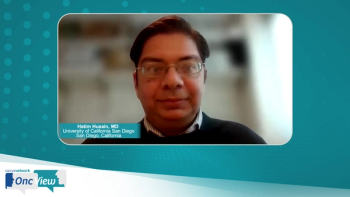
Mobocertinib for the Treatment of EGFR Exon 20 Insertions in NSCLC
Zofia Piotrowska, MD, evaluates the use of mobocertinib in patients with NSCLC and EGFR exon 20 insertions and provides updated results from key trials of mobocertinib in EGFR exon 20-positive NSCLC.
Episodes in this series

Matthew Fowler: Can we shift gears now to mobocertinib, and can you talk about the EXCLAIM trial that led to its approval for patients?
Zofia Piotrowska, MD: Mobocertinib was the second drug approved for EGFR exon 20 insertions. It is great to have 2 different targeted therapy options for these patients. Mobocertinib has a different mechanism of action than amivantamab. Mobocertinib is an oral EGFR tyrosine kinase inhibitor, so an oral targeted therapy. It was approved based on the results of the EXCLAIM trial, which was the initial study of mobocertinib and included a phase 1 and phase 2 portion.
Mobocertinib received accelerated approval by the FDA based on the results of the EXCLAIM trial, which included 114 patients with EGFR exon 20 insertion-positive non–small cell lung cancer. All of them had progressed on prior platinum-based chemotherapy, and were treated with osimertinib in the second- or later-line setting. In this population, we saw a response rate of 28% by blinded independent review. We saw a median duration of response of 17.5 months and a median progression-free survival of 7.3 months. This shows promising results with an oral targeted therapy for these patients.
Toxicities are important to be aware of as with all new therapies. With mobocertinib, we have seen EGFR-related toxicities that we’ve seen with older generations of EGFR inhibitors. Most notably, 91% of patients who were treated with mobocertinib at the recommended phase 2 dose of 160 mg did have diarrhea, including 21% of patients having grade 3 or higher diarrhea. This is an important adverse effect to be aware of, to monitor closely for, and to counsel patients about. We also saw about 45% of patients having a rash, although the majority of patients had low-grade rash. But overall, it is an active therapy for these patients. The accelerated approval by the FDA is for patients who have received prior platinum-based chemotherapy, so it’s an option in the second- or later-line setting for patients with EGFR exon 20 insertion-positive lung cancers who have progressed on prior chemotherapy.
Transcript edited for clarity.
Newsletter
Stay up to date on recent advances in the multidisciplinary approach to cancer.



































